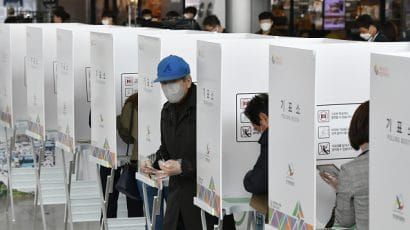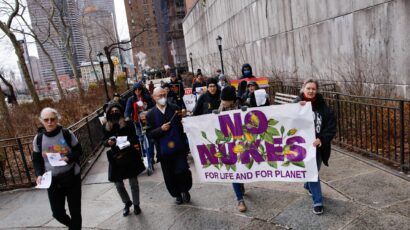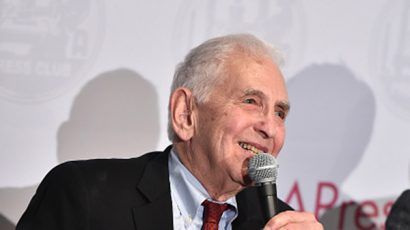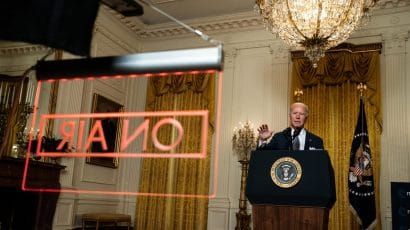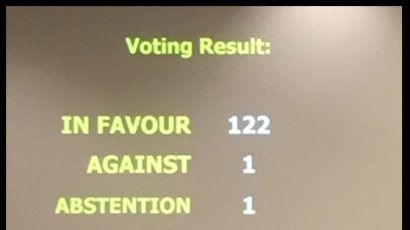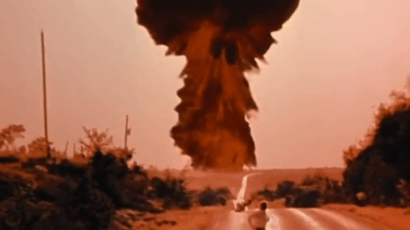Search results for trump
2020 Annual Dinner Program
75th Anniversary Dinner November 12, 2020 – SOLD OUT! We are immensely grateful to members of our Bulletin community for making our virtual 75 Years and Counting Anniversary Dinner a resounding success! Program highlights included inspiring words from former Japanese Minister of Foreign Affairs and Minister of the Environment Yoriko Kawaguchi, a conversation with Rieser Award recipients past … Continued
Climate change and the 2016 election
The Republican presidential candidates have gone to a great deal of trouble to avoid confronting the facts about climate change. These politicians like to say, "I am not a scientist," a truth sadly obvious to any scientist. Yet they have refused to learn what science has discovered about climate change.
Bad chemistry: ISIS and mustard agents
Chemical warfare is still alive and well in Syria and Iraq, because of an enduring belief among regional actors that chemical weapons will get the job done.
Some disagree that it is 100 seconds to midnight. These undergrads held a debate
A group of Stanford students debates whether the Bulletin’s Science and Security Board is acting ethically when setting the hands on the Doomsday Clock.
Amid the Ukraine crisis, looking again at Putin, the one-man show the West doesn’t understand
The stakes for having an accurate understanding of Russia’s president, Vladimir Putin, have never been higher. A misreading could have catastrophic consequences. Here’s what other foreign leaders need to understand about who Putin is, what he wants, how he thinks, where his ideas come from, and why he annexed Crimea in 2014 and intervened in Syria in 2015.
Interview: Duyeon Kim on South Korea’s elections in the midst of a coronavirus pandemic
Bulletin columnist Duyeon Kim offers her views on the variety of intersecting political crosscurrents that connect and affect the upcoming South Korean election, the coronavirus pandemic, and the status of relations between North and South Korea.
How the Koch brothers got us here
Whether through highly-coordinated attacks on federal tax credits or interventions in arcane state-level proceedings, or through public and covert efforts to spread disinformation, the beneficiaries of the Kochs’strategic funding are working to preserve the market demand for the refined petroleum products the Koch empire is selling.
Seven of 2017’s freshest perspectives on nuclear weapons, biological threats, and more
A sampling of the year's best "Voices of Tomorrow" essays.
Collections
Collections In publication since 1945, the Bulletin of the Atomic Scientists has gathered the best science and scientific commentary on the serious human-made existential threats to our species and our planet. The collections below gather a selection of articles published by the Bulletin on subjects that remain critical to our understanding of these threats — from … Continued
Once used as trash dumps, Sri Lanka’s wetlands are remade as flood-buffering parks
Overcoming decades of development and disdain for Colombo's most crucial ecosystem won't be easy.
2021 Annual Dinner Overview
Conversations Before Midnight 2021 Virtual Annual Event November 9, 2021 | 5:00 – 7:00 p.m. C.T. Sign up here to receive an invitation! Keep me informed about the Bulletin’s 2021 virtual annual event. Rose Gottemoeller Gottemoeller is the Frank E. and Arthur W. Payne Distinguished Lecturer at Stanford University’s Freeman Spogli Institute for International Studies and its … Continued
Nuclear deterrence is the existential threat, not the nuclear ban treaty
In response to an article that criticized the nuclear ban treaty, a group of activists argue that a process to abolish nuclear weapons is vital to world safety. From scholarly analyses to known close calls and near misses, they argue, the message is clear: The world has avoided nuclear war only through luck.
Daniel Ellsberg’s message to us, and to future generations
In this April interview with a longtime friend, Daniel Ellsberg, most widely known for leaking the Pentagon Papers, explains why he wanted to focus on his main concern in life, nuclear war. Ellsberg died today at age 92.
Foreign commercial banks: The essential partner in future discussions of the Iran nuclear deal
Before any serious discussions of a renewed Iran nuclear deal get underway, international commercial banking interests (not just government finance ministers) must be given an opportunity to provide substantive input—because, as a practical matter, these private enterprises will have the final say as to how much sanctions relief Iran effectively receives.
A treaty is reached to ban nuclear arms. Now comes the hard part.
The first major hurdle has been overcome
Reality: Humanity can’t indefinitely avoid using nuclear weapons
A Bulletin reader named Ryan Alt argues in the comments to this roundtable that “it is very difficult to imagine [a nuclear weapon] ban [treaty] as anything more than wishful thinking.” Another reader, Keith B. Rosenberg, writes that one should “[n]ever make a treaty that will not be adhered to”—essentially, that the ban treaty is … Continued
Special report: Tilting toward windmills
A homespun Rhode Island destination gets an offshore wind farm—and, mostly, likes it. Will massive offshore wind parks follow, powering America’s Northeast?
An unsettled year in nuclear weapons
The Bulletin’s coverage of the modern nuclear dilemma was truly comprehensive last year. What follows is not a “best of” list, per se, but eight prime examples from the remarkably consistent and excellent offerings our expert authors provided throughout the year.
New roots of famine: How climate crises and global conflict combine to threaten millions in the Horn of Africa
The Horn of Africa is on the verge of famine as the worst drought in 40 years has extended through its fourth rainy season, but drought alone is rarely what causes famine.




